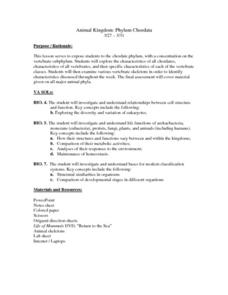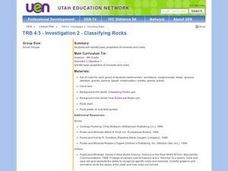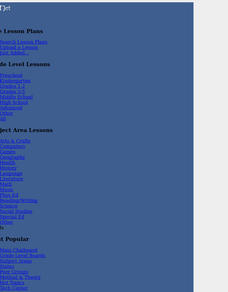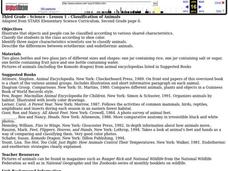Curated OER
Animal Kingdom: Phylum Chordata
Learners use a dichotomous key to classify various vertebrate jar speciments into classes. They examine the speciments for general characteristics of each class and fill in a corresponding chart and then complete a few final assessment...
Curated OER
OBSERVING THE ROLES OF MALES AND FEMALES IN THE NURTURING OF THE YOUNG THROUGHOUT THE ANIMAL KINGDOM
Students watch animal videos to identify and compare the male/female roles of different species of animals. They draw conclusions and compare those roles to those of humans. They discuss how the human male/female roles have changed...
Curated OER
What is in a Name?
Students examine taxonomy and the use of dichotomous keys through two activities. They use a dichotomous key and create one of their own as well as create new scientific Family names for penguins using same word roots used by taxonomists.
Curated OER
Living and Non-Living Things | What’s Alive?
Students compare and contrast living and nonliving things. In this classification lesson plan, students read a book featuring living and nonliving things and then sort pictures of living and nonliving things.
Curated OER
Investigation 2 - Classifying Rocks
Fourth graders identify basic properties of minerals and rocks. They access websites and utilize worksheets imbedded in this lesson to further their understanding of rock classification.
Curated OER
Aquatic Safari
Students use an Internet Web site to locate the scientific information about various marine species. They use the Internet to find the scientific information about marine animals.
Curated OER
Classification of an Echinoderm
High schoolers study starfish through dissection. In this biology lesson plan, students explore the lives of starfish as they view a slide show, observe parts of echinoderms, and compare the classification of the starfish with other...
Smarter Balanced
Classifying Vertebrates
What features do scientists use to classify animals into groups? Class groups examine a series of paired images of vertebrates (a bass and a trout, a toad and a newt, a crocodile and a tortoise, an owl and a robin, a tiger and a bear)...
Curated OER
Arthur's Eyes
Students learn about the parts of the eye. In this eyes and vision instructional activity, students the story Arthur's Eyes and create a KWL chart about eyes. Students label the parts of the eye, examine the eyes of different animals...
Curated OER
Classification of Animals
Third graders practice classiyfying items and identify three major characteristics scientists use to classify animals. They describe the differences between ectothermic and endothermic animals.
Curated OER
Teaching Kids about the Environment
Fifth graders identify the species of plants and animals found in an environment. They compare these findings to plant and animal species found in an unlike environment. Students acquire and compare soil samples from the two sites chosen.
Curated OER
Let Me Tell You About My Favorite Animal
Students create books about their favorite animals using graphic organizers.
Curated OER
Mammals And Reptiles
In this animal learning exercise, 3rd graders study the aspects of the different animal classifications of mammals vs. reptiles. Students cut out 8 animals and paste them on the chart in the correct category.
Curated OER
The Game of Life
Learners describe what it means for a marine animal or fish to be threatened or endangered after playing game simulating extinction.
Curated OER
The Game of Life
Students explore the game of life which refers to what happens to a species when most of the population is gone. In this endangered species activity, students describe what it means for a marine animal to be endangered. Students then...
Curated OER
Animals Galore
Third graders use structural characteristics to sort and classify animals into groups.
Curated OER
Who's There
Fifth graders, in groups, make a list of at least three animals that would survive well in a particular environment. After an allotted time, they pass their list to another group, where they will add to it. They discuss adaptations each...
Curated OER
Acute Triangles
Learners study acute triangles. They measure angles using a protractor, then classify the triangles as either right, obtuse, or acute. Everyone creates a design for a Navajo rug using only acute triangles.
Curated OER
Butterfly Life Cycle
Students identify the stages in the butterfly life cycle. After completing a KWL chart, students participate in a brief lecture on the stages of the butterfly life cycle. Using reading books and Internet research, students complete an...
Curated OER
Under The Sea
In this resource instructional activity, learners use non-fiction books to research ocean animals. Students discover the many features of non-fiction books and how to use these features to help them conduct research. Learners then...
Curated OER
Life at Risk
Students examine the characteristics of the peregrine falcon. They investigate endangered and extinct species, and how the environment affects the process.
Curated OER
Animals That Fly or Do Not Fly
Students create a chart and classify animals according to if they can or cannot fly. They find and cut out pictures of the animals and glue them in the correct place on the chart.
Curated OER
Using Hyperstudio To Introduce Dinosuars
Students access this multimedia program as an introduction to dinosaurs. The program will provide information regarding the classification of several dinosaurs. They view the multimedia program to develop background information for their...

























